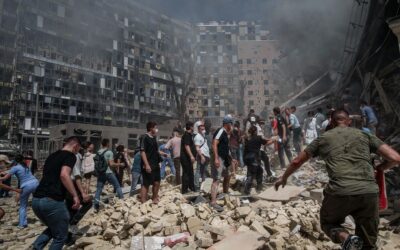 The introduced themselves with a short video showing the park near the Sydney Opera House, a room at Wellington, a beach on a Pacific island. Some of the Focolare’s local communities offered dances from their local traditions that exuded the natural radiance of the cultures found in Oceania.
The introduced themselves with a short video showing the park near the Sydney Opera House, a room at Wellington, a beach on a Pacific island. Some of the Focolare’s local communities offered dances from their local traditions that exuded the natural radiance of the cultures found in Oceania.
January 26-27 2013: Different cultures, traditions, Churches and religions. Oceania is the most cosmopolitan culture in the world. “The Spot” Hall at the University of Melbourne is a spectacle in itself because of its unique architecture and shiny cubes of light, but also because of the variety of people found in the audience. Everyone was an imigrant here, except for the original natives of the Pacific Islands.
 Australia Day. Today is the national holiday but the aboriginal population far more prefers the Sorry Day which is celebrated in May. This is the “day of excuses” that was instituted to recall and repair the wounds inflicted on the local populations by colonialism, especially Australia where the impact was most felt by the aborigines. But it also recalls the paths of reconciliation, like the New Zealand one that has led to the creation of effective organisations of ethnic and cultural harmony. Before Sunday Mass, an aboriginal ceremony is performed that recalls the wairua tapu (mother earth), since she is worthy of honour and respect.
Australia Day. Today is the national holiday but the aboriginal population far more prefers the Sorry Day which is celebrated in May. This is the “day of excuses” that was instituted to recall and repair the wounds inflicted on the local populations by colonialism, especially Australia where the impact was most felt by the aborigines. But it also recalls the paths of reconciliation, like the New Zealand one that has led to the creation of effective organisations of ethnic and cultural harmony. Before Sunday Mass, an aboriginal ceremony is performed that recalls the wairua tapu (mother earth), since she is worthy of honour and respect.
The celebration consists in placing hands on a mound of earth placed in the hollow of a large and welcoming bank. The little children together with Maria Voce and Giancarlo Faletti are invited to place their hands. Then the president of the Focolare receives from the hand of the aboriginal celebrant a wooden blade on which is inscribed a picture of the Australian landscape, the nine territories into which it is divided, according to the cosmogony geography of the Aborigines.
 There is the long intense history of the lands of Oceania and there is the history of the local Focolare Movement. And exciting film presented a few moments of this history with the arrival of Rita Muccio in 1967, then the arrival of Maddalena Cariolato, the first locals to welcome the “spirit of Chiara”, individuals and families, youths and the not so young, in Melbourne and Perth. Then there was the “landing” in New Zealand, Wallis and Futuna, New Chaldonia and the Fiji Islands. Some of those people are still living, and some have already “arrived”. Among these are Margaret Linard and New Zealander Terry Gunn. All of them bear witness to having met in the charism of Chiara Lubich the possibility of living the Gospel. With the simplicity and radicalism that characterises this “very new world” coupled with love for neighbour, their lives were changed.
There is the long intense history of the lands of Oceania and there is the history of the local Focolare Movement. And exciting film presented a few moments of this history with the arrival of Rita Muccio in 1967, then the arrival of Maddalena Cariolato, the first locals to welcome the “spirit of Chiara”, individuals and families, youths and the not so young, in Melbourne and Perth. Then there was the “landing” in New Zealand, Wallis and Futuna, New Chaldonia and the Fiji Islands. Some of those people are still living, and some have already “arrived”. Among these are Margaret Linard and New Zealander Terry Gunn. All of them bear witness to having met in the charism of Chiara Lubich the possibility of living the Gospel. With the simplicity and radicalism that characterises this “very new world” coupled with love for neighbour, their lives were changed.
And it was precisely love of neighbour that was the main theme of Maria Voce’s remarks: Just as the three Kings recognized the greatness of the Son of God in a tiny baby boy, so too must we come to recognise Jesus in every neighbour, also beyond appearances. The open discussion that followed immediately took on an existential tone, when a child asked how we can believe in a God we do not see! The youths asked how they were to resist the solicitations of modern society. The elderly discussed their role in the communion among the generations; some brought up questions on how to advance the ecumenical or interreligious dialogue. Serious issues were not avoided, such as the sexual abuse of minors in the Catholic Church, the growing stress in the cities that impedes progress in holiness, the temptation of consumerism that snuffs out witness to the Gospel, the absence of God in people’s lives, and the courage it takes to bear witness to His love.
Maria Voce ended with a wish: “Australia is a big land, we need to bring her love and unity. Our big family cannot live on memories in a photo album, we need to move forward. Then we’ll be writing a new album.”
By Michele Zanzucchi, correspondent




0 Comments